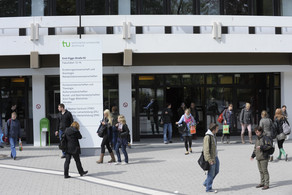PD Dr. Alexander Dunst
Dr. Alexander Dunst

Office:
Emil-Figge-Str. 50 , Room tba
Tel:
+49 231 755 XXXX
E-Mail:
alexander.dunst@tu-dortmund.de
Office hours:
tba
Alexander Dunst holds an Mag. phil in English and American Studies from Vienna University and a PhD in Critical Theory from the University of Nottingham and was a prize-winning poet and political journalist for Profil, Austria's major news magazine, before entering academia. From 2013 to 2023, he taught at Paderborn University, where he directed an early career research group on digital approaches to comics research and gained his habilitation in 2021. He has been a visiting research professor at the University of Pennsylvania, a guest professor at Friedrich-Alexander-Universität Erlangen-Nürnberg, and a DAAD lecturer at the English and Foreign Languages University (EFLU) in Hyderabad, India.
His research and teaching focus on twentieth-century cultural history, the digital humanities, and contemporary US fiction. He has published in journals such as Modern Fiction Studies, New Formations, and Parallax, and is the author of Madness in Cold War America (Routledge, 2016 & 2018) and The Rise of the Graphic Novel: Computational Criticism and the Evolution of Literary Value (Cambridge University Press, 2023). In addition, he has co-edited two volumes of essays, The World According to Philip K. Dick (Palgrave, 2015) and Empirical Comics Research (Routledge, 2018 & 2020), as well special issues on Digital Scholarship in American Studies for the journal Amerikastudien and Collective Subjects and Political Transformation in the journal Subjectivity. Since 2023, he is also honorary research fellow at the "Centre for the Social History of Health and Healthcare" at Strathclyde University, Glasgow.
-
Comics and Graphic Novels
-
Literature and Intermediality
-
Digital Humanities
-
Film and Television
-
Twentieth-Century U.S. and Transnational Cultural and Intellectual History
-
Cultural Theory
- Health Humanities
Monographs / Textbooks:
Alexander Dunst, The Rise of the Graphic Novel: Computational Criticism and the Evolution of Literary Value (Cambridge: Cambridge University Press, 2023), 254 S.
Alexander Dunst, Madness in Cold War America (New York: Routledge, 2016 & 2019 [Paperback]), 184 S. (Routledge Studies in Cultural History 46).
Articles in edited volumes:
Alexander Dunst, Despo Kritsotaki, Nicolas Heynckes, Chantal Marizia, Matthew Smith (eds.), Challenging Medicine: Global Health and Social Movements, 1950s-2020s(Manchester: Manchester University Press 2025) (Social Histories of Medicine). [in preparation]
Alexander Dunst & Dennis Mischke, Digital Scholarship in American Studies, Special Issue of Amerikastudien 63-2 (2018), 121 p.
Alexander Dunst, Jochen Laubrock & Janina Wildfeuer, Empirical Comics Research: Digital, Cognitive, and Multimodal Methods (New York: Routledge, 2018 & 2020 [Paperback]), xvi + 349 p.
Alexander Dunst & Stefan Schlensag, The World According to Philip K. Dick (Basingstoke: Palgrave Macmillan, 2015, ix + 234 p.
Alexander Dunst & Caroline Edwards, Collective Subjects and Political Transformation, Special Issue of Subjectivity 4-1 (2011). 102 p.
Journal Articles:
Alexander Dunst, „How We Read Comics Now: Computational Criticism, Literary Studies and the Rise of the Graphic Novel” Modern Fiction Studies 67-4 (2021): 758-784.
Alexander Dunst, „Computing Literary Surplus Value: Alan Moore and the Density of the Comic Book as Graphic Novel“, in: Gabrielle Rippl & Ursula Lenker (Hg.) Book Histories in the Digital Age, Special Issue of Anglia 139-1 (2021), 195-223.
Rita Hartel & Alexander Dunst, „An OCR Pipeline and Semantic Text Analysis for Comics“ in: A. Del Bimbo et al. (Hg.), ICPR 2020 Workshops. Cham, Switzerland: Springer, 213-222. Springer Lecture Notes in Computer Science 12666)
Jochen Laubrock & Alexander Dunst, „Computational Approaches to Comics Analysis“ Visual Narrative Research: An Emerging Field in Cognitive Science, Special Issue ofTopics in Cognitive Science 12-1 (2020): 274-310.
Rita Hartel & Alexander Dunst, „How Good is Good Enough? Establishing Quality Thresholds for the Automatic Text Analysis of Retro-Digitized Comics“ in: I. Kompatsiaris et al. (Hg.), Multimedia Modeling. MMM 2019. Cham, Switzerland: Springer, 662-671. (Springer Lecture Notes in Computer Science 11296).
Alexander Dunst, „Ordinary Madness: Don DeLillo’s Subject from Underworld to Point Omega” Amerikastudien 62-1 (2017): 35-50.
Alexander Dunst, Rita Hartel & Jochen Laubrock, „The Graphic Narrative Corpus (GNC): Design, Annotation, and Analysis for the Digital Humanities” in: Proceedings of the 14th IAPR International Conference on Document Analysis and Recognition (2017): 15-20.
Alexander Dunst, „Digital American Studies: An Introduction and Rationale" Amerikastudien 61- 3 (2016): 381-95.
Alexander Dunst, Elahe Haschemi Yekani & Anja Schwarz, „The Here And Now of Cultural Studies" Journal for the Study of British Cultures 21-2 (2014): 195-222.
Alexander Dunst, „After Trauma: Time and Affect in American Culture Beyond 9/11” Parallax 18-2 (2012): 56-71.
Alexander Dunst, „Ordinary Paranoia: Rethinking (American) Conspiracy Studies/Navadna paranoja: ponoven premislek o studiju (ameriske) zarote” Paranoia: Spellbound Spaces of Culture and Politics, Sondernummer von Dialogi: Revija za Kulturo in Družbo 11 (2011): 120-35.
Alexander Dunst, „Late Jameson, or, After the Eternity of the Present” New Formations 65 (2008): 105-18.
Book Chapters:
Alexander Dunst, „When Black Power and Antipsychiatry Met: Reassembling the ‘Congress on the Dialectics of Liberation’”, in Alexander Dunst, Despo Kritsotaki, NicolasHeynckes, Chantal Marizia, Matthew Smith (Hg.), Challenging Medicine: Global Health and Social Movements, 1950s-2020s (Manchester: Manchester University Press 2024). [in preparation].
Alexander Dunst, „Digital Humanities,” in Marcus Hartner and Nadine Böhmer-Schnitker (Hg.), Handbook of Interdisciplinarity (Berlin: De Gruyter 2024) [in preparation].
Alexander Dunst, „Autofiktion und Trauma: Rachel Cusk, Ben Lerner und der Sebaldsche Roman der englischsprachigen Gegenwartsliteratur“, in Kay Wolfinger, Claudia Öhlschläger, and Michael Niehaus (Hg.), Traditionen des Pathos: W. G. Sebald und die Literatur der Gegenwart (Würzburg: Königshausen & Neumann 2024) [im press].
Alexander Dunst & Rita Hartel, „Computergestützte Comicforschung”, in: Christian Bachmann et al. (Eds.), Handbuch Comicforschung (Berlin: De Gruyter 2023) [impress].
Alexander Dunst, „Surplus Feelings: Neoliberal Noir and the Affective Economy of Debt“, in: Christopher Breu & Elizabeth Hatmaker (Hg.), Noir Affect (New York:Fordham University Press, 2020), 222-240.
Alexander Dunst & Dennis Mischke, „Introduction: The Challenge and Promise of Digital American Studies“ Amerikastudien 63-2 (2018): 131-140.
Alexander Dunst, Jochen Laubrock & Janina Wildfeuer, „Comics and Empirical Research: An Introduction”, in: Dunst, Laubrock & Wildfeuer (Hg.), Empirical Comics Research: Digital, Cognitive, and Multimodal Methods (New York: Routledge, 2018), 1-23.
Alexander Dunst & Rita Hartel, „The Quantitative Study of Comics: Towards a Visual Stylometry of Graphic Narrative”, in: Empirical Comics Research: Digital, Cognitive, and Multimodal Methods (New York: Routledge, 2018), 43-61.
Alexander Dunst, „’All the Fits That’s News to Print’’: Deinstitutionalisation and Anti-Psychiatric Movement Magazines in the United States, 1970-1986”, in: Despo Kritsotaki, Vicky Long & Matthew Smith (Hg.), Deinstitutionalisation and After: Post-War Psychiatry in Global Perspective (Basingstoke: Palgrave Macmillan, 2016), 57-74.
Alexander Dunst, „Sacco with Badiou: On the Political Ontology of Comics”, in: Daniel Worden (Hg.), The Comics of Joe Sacco: Journalism in a Visual World (Jackson, MS:University of Mississippi Press, 2015), 168-83.
Alexander Dunst, „Introduction: Third Reality: On the Persistence of Philip K. Dick", in: Alexander Dunst & Stefan Schlensag (Hg.), The World According to Philip K. Dick (Basingstoke: Palgrave, 2015), 1-10.
Alexander Dunst, „Unheimliche Heimat: Homeland und die Ästhetik des Imperiums“, in: Martin Doll & Oliver Kohns (Hg.), Die Zwei Körper der Nation: Ästhetische Figurationen des Politischen (München: Fink, 2015), 17-38.
Alexander Dunst, „The Politics of Conspiracy Theories: American Histories and Global Narratives”, in: Michael Butter & Maurus Reinkowski (Hg.), Conspiracy Theories in the US and the Middle East: A Comparative Approach (Berlin: De Gruyter, 2013), 293-311.
Alexander Dunst, „The Body of the Image, or towards a Collective Art Practice”, in: Artur van Balen & Jakub Simcik (Hg.), Eclectic Electric Collective: El Martillo Project (New York: Minor Compositions, 2012), n. p.
Alexander Dunst & Caroline Edwards, „Collective Subjects, Emancipatory Cultures, and Political Transformation”, Einleitung zu Collective Subjects and PoliticalTransformation, Sondernummer von Subjectivity 4-1 (2011), 1-8.
Alexander Dunst, „Thinking the Subject beyond its Death: Madness and Contemporary Culture”, in: Jan D. Kucharzewski, Stefanie Schäfer & Lutz Schowalter (Hg.), Hello, I Say, It’s Me: Contemporary Reconstructions of Self and Subjectivity (Trier: WVT, 2009), 76-92.
Employment
since 02/2023 Vertretungsprofessur (Acting Professor) "American Studies and the Media" TU Dortmund
2013-2022 Akademischer Rat auf Zeit (Assistant Professor), Department of English and American Studies, Paderborn University
10/2022-03/2023 Vertretungsprofessur (Acting Professor) Lehrstuhl für Amerikanische Literatur und Kultur, FAU Erlangen
04/2020-03/2021 Vertretungsprofessur (Acting Professor) "Digitale Kulturwissenschaften", Paderborn University
04/2015-10/2019 Nachwuchsgruppenleiter BMBF eHumanities "Hybrid Narrativity"
2011-2013 Wiss. Mitarbeiter (Lecturer) Department of English and American Studies, University of Potsdam
Education
Habilitation Paderborn University (06/2021)
PhD Department of Cultural, Media and Visual Studies, University of Nottingham (GB)
Mag. phil Vienna University (Austria)







